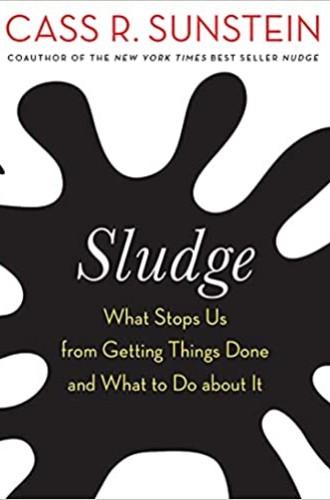In a recent New Yorker cartoon, an exhausted-looking woman explains to a friend: “We’ve just come from a seven-hour seminar on how to fill out the 2021 mayoral-election ballot.” That’s sludge.
Sludge, according to Cass Sunstein, is whatever frictions separate us from what we want. It comes in many forms: Excessive waits. Required travel. Lengthy forms to fill out. Mandatory detailed reports. Poorly designed websites. Red tape. Or even sensible requirements that take more time than we can spare, because, as Sunstein says, “time is the most precious commodity that human beings have.”
If Sunstein feels short of time, it may be because he has written or coauthored some 60 books, including six in 2021—so far. Other than writing, he headed the Office of Information and Regulatory Affairs during President Obama’s first term, has taught at the University of Chicago, Columbia, and Harvard law schools, is a recognized expert on the Star Wars franchise, and currently ranks 695th among worldwide male players in the Professional Squash Association. Surprisingly, his 2021 book titled This Is Not Normal is not an autobiography.
Though Sunstein clearly has little time for sludge, he admits that some sludge is good, or at least necessary. Sludge may save us from minor accidents (Do you really want to delete that file?) or from rash decisions about life-changing matters such as marriage and divorce. Sludge may help to ensure that programs are cost-effective and that people qualify for the benefits they hope to receive.
Some sludge may be either good or bad, depending on our priorities. Is it preferable to maximize sludge in order to weed out cheaters and slackers or to minimize sludge in order to distribute benefits as quickly and broadly as possible? Is it better to make abortion hard to get so that fewer pregnancies are aborted or to make abortion widely accessible so that women may make their own decisions without resorting to dangerous do-it-yourself procedures?
Much sludge is accidental, as when bureaucrats write incomprehensible instructions. Some sludge is intentional, as when newspapers make it easy to subscribe (automatic renewal!) and hard to cancel (telephone only, and good luck trying to figure out the phone tree). Some sludge is both intentional and malicious. When states create new obstacles to voter registration, remove polling stations in urban areas, and ban most voting by mail, for example, they know they are making it harder for minorities, seniors, and people of low income to vote. “That,” Sunstein writes, “is a disgrace.”
Whether accidental, intentional, or malicious, most sludge is bad. “It hurts all of us,” Sunstein writes, “but if you are sick, old, disabled, or poor, or if you don’t have a lot of education, sludge is a curse.” Extreme circumstances make sludge especially dangerous, as the COVID-19 pandemic made clear:
Countless people were scared, confused, overwhelmed, or anxious about their health or their finances. They might have been dealing with young children at home, with sick or elderly friends and relatives, or with both. They might have been sick themselves. Because they were frightened and preoccupied, they did not have a lot of mental bandwidth to manage sludge, whether it came from the government or the private sector. Sludge could defeat them. And it could do so with respect to programs on which their economic situation, or their health, depended.
Fortunately, Sunstein notes, “the pandemic concentrated the bureaucratic mind, leading to impressive and brisk reforms.” Agencies such as SNAP, the IRS, and the FDA simplified their procedures and rushed aid to panicked people. No doubt sludge reduction meant that some people got more aid than they needed, but many more people were at least temporarily rescued from hunger, homelessness, or serious illness. For Sunstein, that was good news. Eliminating sludge, even at the expense of perfect accuracy or ideal safeguards, “might be the price for saving lives.”
But sludge persists. Legislators who dislike Medicaid or universal health care introduce sludge so that fewer people will apply; states that don’t want fair elections introduce sludge so that fewer people will vote. They know that already overwhelmed people, when faced with a mountain of sludge, are likely to give up in despair.
To avoid inadvertently or intentionally separating people from what they need, Sunstein recommends asking these questions of policies and proposals:
Who, exactly, is being helped, and who is being hurt? Is sludge hurting the most vulnerable members of society? Is sludge being imposed on people who are poor or desperate, or in some sense struggling?
Without tying his questions to any faith tradition, Sunstein has neatly summarized the preferential option for the poor, which derives from the Hebrew prophets and the New Testament gospel of the kingdom. Christians who favor sludge should think twice about what it may do to those who Jesus called “the least of my brothers and sisters.”





